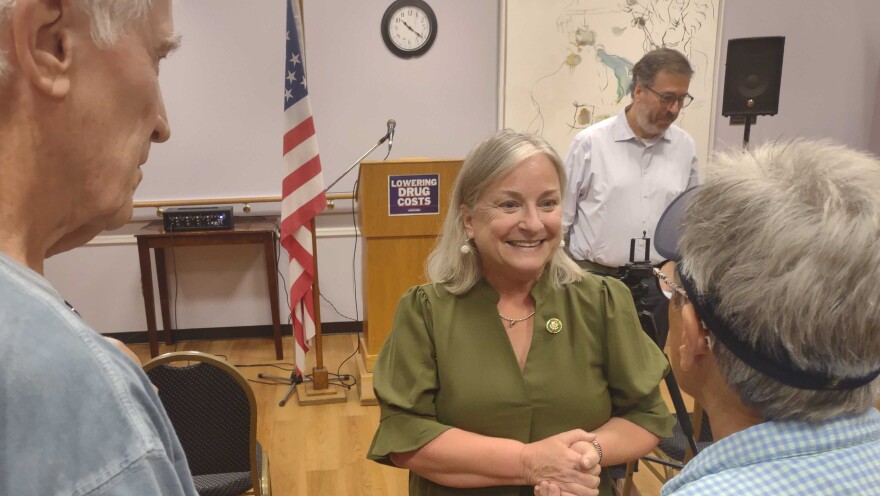- U.S. Rep. Susan Wild said Tuesday the opening of negotiations between the federal government and drug manufacturers over medication costs is cause for celebration
- Nine million Medicare recipients paid $3.4 billion in out-of-pocket costs last year for the 10 drugs up for negotiation, Wild said
- Critics allege the federal government shouldn't be getting involved in setting the market for drug costs
ALLENTOWN, Pa. — Sandy Niebell doesn't consider herself an overly political person.
Niebell, of Lehigh Township, said she stopped identifying with any party after getting letters addressed to her by her maiden name, ex-husband's last name and her married name, urging her to register to vote.
"Do I get to vote three times?" she said.
Yet there was Niebell, speaking before U.S. Rep. Susan Wild, D-Lehigh Valley, on Tuesday to a dozen fellow seniors about drug prices.
Last week, the federal government announced negotiating costs with pharmaceutical companies over 10 drugs for Medicare recipients.
"We, as seniors, we have enough to worry about, and the doctor shouldn't have to listen to me whine about the cost every time he sees me."Sandy Niebell of Lehigh Township
Niebell's cardiologist had prescribed her two of the 10, the blood thinners Xeralto and Eliquis, as they searched for critical medication to which she wouldn't have an allergic reaction.
The first Eliquis prescription cost her about $700 out of pocket, she said. The Xeralto prescription, at $3,200, was too expensive to seriously consider; she paid $88 for a generic medication that put her in the emergency room three days later.
"These prices never should have been this high," Niebell said, using a hot pink cane to keep her balance at the podium.
"We, as seniors, we have enough to worry about, and the doctor shouldn't have to listen to me whine about the cost every time he sees me."
Something worth celebrating
Wild, who has made reducing drug prices one of her top priorities since she took office in 2019, described the start of negotiations as something worth celebrating.
Countries such as Canada and Mexico have long negotiated drug prices, but Americans have been getting price-gauged by drug makers for ages, Wild said.
The 10 drugs, she said, were selected because they are in high demand but their manufacturing costs are out of whack with the price their fetching on the market.
"Prices of drugs in this country are literally based off need, and it's not like the usual supply and demand. If anything, the price goes up. The more people need it, the higher the price goes."U.S. Rep. Susan Wild
"Prices of drugs in this country are literally based off need, and it's not like the usual supply and demand," Wild said. "If anything, the price goes up. The more people need it, the higher the price goes."
It remains to be seen how much savings the price negotiations will actually create. Medicare and the manufacturers will have 10 months to reach a deal, and whatever agreements are reached won't go into effect until 2026.
And at least eight lawsuits have been filed challenging the negotiations, which were enacted through last year's Inflation Reduction Act.
But Wild said 9 million American seniors paid $3.4 billion in out-of-pocket expenses on these 10 drugs in 2022. Reaching a lower sales price on these drugs will have real ramifications for Americans of all ages, she said.
Opposition already forming
Medicare, as the largest buyer of prescription drugs, will set the baseline for insurance companies in their negotiations for the same drugs, Wild said. It's one of the few times in living memory the federal government has stood up to Big Pharma, she said.
"This is not just about seniors, although seniors are the ones who take the most medications in this country," she said.
"I pledge to you, this is always just going to be top of mind for me."U.S. Rep. Susan Wild, D-Lehigh Valley, on lowering drug costs
Wild said she hoped the precedent set by the Medicare negotiations will lead Congress to eventually let the Centers for Medicare & Medicaid Services to haggle over all drug prices, not just the 10 selected by the Biden administration.
The Department of Veterans Affairs already negotiates drug prices, she noted. She's already co-sponsored the proposed Lowering Drug Costs for American Families Act, a bill that would expand the list of medications that can have their prices negotiated.
"Sometimes in Washington, you'll see this where we get something passed and it's a little bit helpful, and then it's almost like all of Congress collectively moves on to whatever the next issue is," Wild said.
"I pledge to you, this is always just going to be top of mind for me."
Wild's support already has drawn political attacks.
The 60 Plus Association, which bills itself as a non-partisan non-profit that advocates for market-based solutions, has peppered Pennsylvania's 7th Congressional District with mailers urging voters to fight back against "40 radical Democrats" who want the federal government involved in determining drug prices.
A small photo of Wild is featured on the front.
"In the real world, the federal government doesn’t negotiate with private businesses. It tells them what to do," the non-profit said in a news release issued last week.


